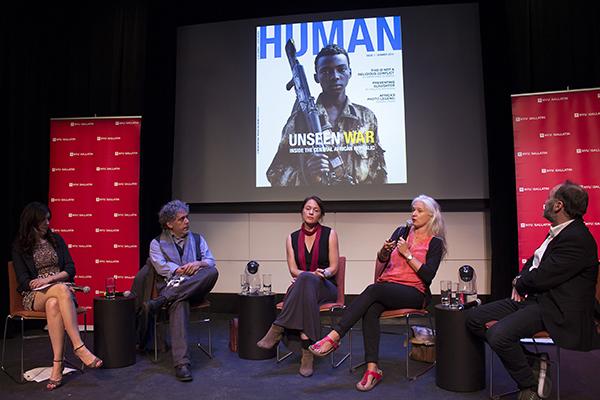The Human Rights Symposium
September 27, 2015

A group of 11 undergraduate and graduate students from various NYU schools spent the last summer interning across the globe to ad- dress human rights issues. These Gallatin Global Human Rights fellows were each given a grant to collaborate with organizations focused on matters such as LGBTQ rights and fair water access.
The Gallatin Global Fellowship in Human Rights gives students the opportunity to extensively research current global human rights climate and actively apply them at internships across the globe. The program is comprised of a summer internship and two semesters of planning and analyzing that culminate in a presentation where the fellows share their findings with the NYU Community.
This year’s fellows presented at a symposium Thursday, speaking for ten minutes each in two panels. One panel moderator was Patrick McCreery, Gallatin’s Assistant Dean for Global Programs, who has seen increased growth in the program.
“In the first year, 2011, it was only open to Galla- tin students, then we gradually opened it to all parts of NYU,” McCreery said. “We’ve had more and more applications — we’re seeing this really blossoming response.”
Vasuki Nesiah, Gallatin professor and Academic Director of the program, moderated the second panel. She was responsible for directing and guiding the fellows’ projects to completion.
“These students combine academic excellence with deep political commitments and brought a critically reflective sensibility to their work,” Nesiah said. “This year, I thought we had a particularly exciting range of civil and political rights and economic and social rights projects.”
Though the topics were as diverse as transient workers rights and digital privacy rights, the fellows all emphasized that connect- ing with and understanding each other is at the core of human rights advancements.
One panelist, Steinhardt junior Shaquille Romblay, worked with Jamaican organization known as the Jamaica Forum for Lesbians, All-Sexuals and Gays. Their objective is to promote tolerance and acceptance of all, regardless of sexual orientation and gender identity.
“Once you can find a way to connect with people, they kind of begin to understand,” Romblay said. “They think, ‘Oh, I don’t want to be the person who will be made fun of,’ so we found ways to connect with the people who didn’t like the idea of J-FLAG.”
An important facet of the fellowship is develop- ing an understanding of human rights on a global scale. Fellow and Gallatin junior Robert Ascherman, who interned in South Africa with the Abahlali baseMjondolo (Shack Dwellers) Movement, explained how language use dif- fers across the globe.
“They [shack dwellers] might not use the language ‘human rights’ — they laugh at me for using it — but they’ll say ‘I have a housing right,’” Ascherman said.
Regardless, the fact that populations everywhere are willing to speak out against injustice is what he found to be a major part of the movement.
“When I talk to a shack dweller in South Africa, they say ‘I’m born and I’m alive and I’m a human, so that means that I have a right to a home and I’m going to fight for it,’” Ascherman said. “That is human rights at its finest.”
Gallatin senior Jacqueline Hsia attended Gallatin’s Human Rights Week for the first time. She said the presentations helped contextualize some of her studies as well as piqued her interest.
“I realized that human rights is more about governmental, top-down things,” Hsia said. “It’s also so much about what we can do on a daily basis — being aware and kind of talking about it.”
Applications for the 2016 Gallatin Global Fellow- ship in Human Rights, which are due on Oct. 30, can be found online at: http://gallatin.nyu.edu/studentlife/scholarly/globalfellowship.html.
A version of this article appeared in the Sept. 28 print edition. Email Grace Halio and Diamond Naga Siu at [email protected].
